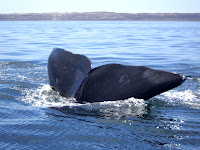
Weeks of debating, vacilating, arguing and dilly-dallying finally brought me, Natasha and our newfound friend Alice to El Calafate, to see the Perito Moreno glacier. This was Patagonia proper, where the wind challenges all and people are scarce. We had been debating whether to come here because it is expensive and isolated...would it be worth going South for a glacier?
We got up early on the 13th and went to get our rental car. The bus to the glacier was a rip-off, so we teamed up with a lovely American called Kate and her Argentinian boyfriend Rodrigo, and rented a sexy machine...a VW Golf! Rodrigo nicknamed it "The Landrover."
It was an incredible experience, and Tash was in her element. Freedom. No bus schedules to stick to, just open road. We took a detour before heading to the glacier, down 50km of unpaved, bumpy madness, with the road stretching ahead, and snowy peaks on the horizon. Tash was like a rally driver, loving every second. I was terrified! Our detour took us to Laguna Roca, a milky turquoise, deserted lake. We savoured the fresh air and the view, Alice found a tree stump that she was very fond of, and we had our mandatory lakeside stone-skimming competition.
Then, after the "Land Rover" did a spot of off roading, we rejoined the main road to the glacier.
The entrance fee was 75 pesos for us English, 25 for Rodrigo, and only 8 for Kate, as she was a student! Absurd! I don´t mind paying, but I do mind being ripped off just for being foreign!
So, with my wallet considerably lighter, we set off down the final stretch of winding, cliff-hugging road. Lago Argentina stretched out below us, to the feet of the towering mountains, and on the surface of the lake we could see tell-tale signs of the glacier; icebergs, solitary and somehow imposing, gleaming in the Sun as they slowly melted.
Finally, we rounded a bend and there it was; bigger than I could have imagined, like an icy tongue tearing the mountains down, 5 km wide and 60 metres high. We were still a few kilometres away, but the excitement in our car was palpable. Kate was from Montana, and had seen glaciers before, but nothing like this. We finally got to the carpark, and went to the wharf where they do boat trips to the glacier...no more boats! Dismayed but not defeated, we drove 10km to another small dock, and got our tickets with two minutes to spare.
Once on board, we jostled for a decent viewing position out on deck with the million or so other tourists, before stopping in front of the glacier. I have had a month to reflect on how I felt, staring at that geographic marvel, and I still cannot really put it into words. Not only is it one of the most beautiful things I have ever seen - a thousand blue hues, a cold-warm colour that changes constantly - it is also one of the most astonishing things I have ever heard.
Up on the balconies situated opposite the beast (I will call it that becuase it constantly moves and changes like some organic being, and its sheer size makes it a beast) you see and hear the glacier calving; blocks of ice the size of shopping centres break off the main body of the glacier and tumble into the lake, thus creating the lake. Destructive creation. After you see this unearthly spectacle, and shockwaves lap up against the shore, you begin to hear it, as the sound takes a few seconds to catch up. First, an ominous crack, as though bvehind the ice some monster prowls. Then, a creaking groan, and finally a thunderous roar. After watching, entranced, for a few hours, we began to anticipate the grand moments of calving. The sound was like mixing classical music and heavy metal. After each climax, silence would descend, and everyone would wait, wanting this natural orchestra to strike up again.
From the top of the balconies, you could see the glacier stretching back into the mountains,hidden and unaccessable. Since arriving in South America, we have seen volcanoes, deserts, mountains, and now this...all these natural phenomenon make me recall geography lessons back at LRGS, with my enthusiastic teacher, Mr. Talks, trying to persuade us how great glaciers and things really were. But black and white diagrams and technical terms do not do the natural world justice, especially not for teenagers in classrooms. You have to see it. And now, having seen it, I understand what Mr. Talks was talking about. Geography is amazing, and this continent has reignited my passion for it.
So, glacier Perito Moreno. Awesome in the truest sense of the word, but impossible to be confined by adjectives. A relic of the Ice Age, and a highlight of this trip. Definitely worth going South!
More photos Click Here!










